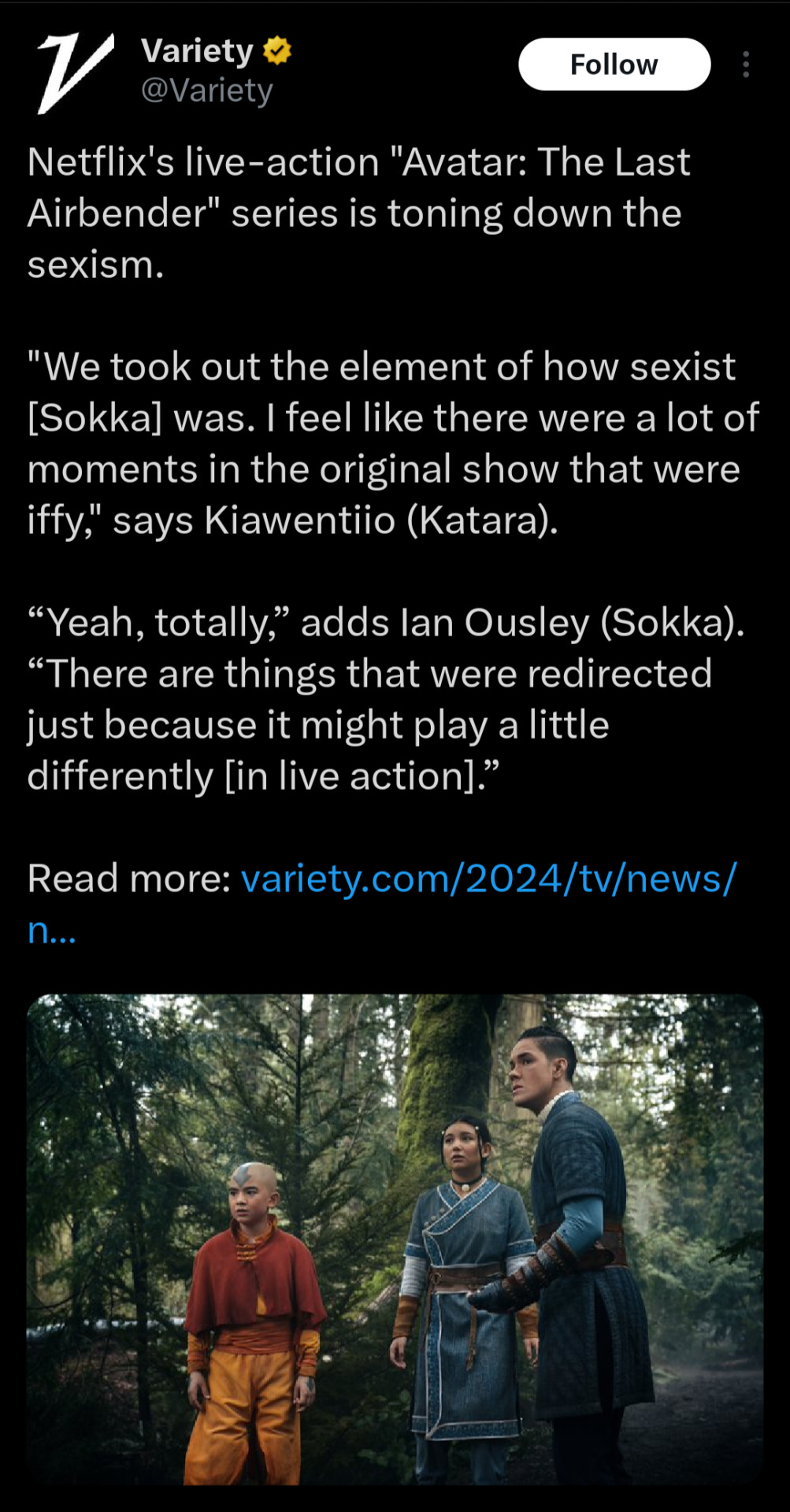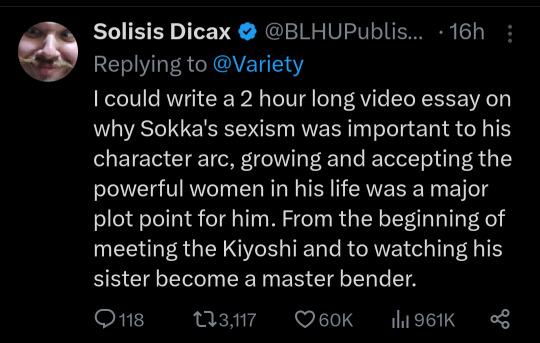#at this point zuko will join the gaang on a whim and not after several seasons of character growth
Explore tagged Tumblr posts
Text


the studio really said forget character development we are too afraid to develop our characters
#avatar the last airbender#avatar the last airbender live action#atla live action#sokka#atla#at this point zuko will join the gaang on a whim and not after several seasons of character growth#the studio said our characters are perfect from the get-go no development here
2K notes
·
View notes
Text
why zuko had to screw up at ba sing se
[ or: all hail cognitive-dissonance-lord zuko ]
When I watched Avatar for the first time, I did it totally out of order. The first episode I saw was Cave of Two Lovers, I watched the finale before Western Air Temple, and the first episode was one of the last I saw. I was mostly at the mercy of the whims of Nickelodeon’s Saturday morning marathons.
So I knew from almost the beginning that Zuko (spoiler alert) was going to grow his hair out and switch sides, and I knew it happened mid book 3. Watching Crossroads of Destiny, then, was a totally different experience. When Azula gave him the ultimatum, I knew which side he’d choose, and I was so frustrated and angry. I wanted Zuko to be good already, dammit. After all of the development and the “metamorphosis” he’d gone through only a few episodes ago, I was convinced that his mistake in CoD was in there purely for shock value (and for me, knowing how it ended, I didn’t even get to experience that) and to draw out the angst. I was bitter because I felt cheated out of a half season’s worth of Redeemed!Zuko hanging out with the gaang. (It’s also worth mentioning that I was like 12.)
But now I know I was completely wrong. Whenever I try to think about what would have happened with the rest of the series if Zuko had sided with Aang instead of Azula, it just doesn’t work. Zuko needed to make that mistake in the crystal catacombs, and I can’t imagine his story without it.
Zuko developed a lot as a character through his travels in the Earth Kingdom up until his moment of truth under Ba Sing Se. He was rejected by his father, who sent Azula to imprison him and put out wanted posters that permitted anyone to kill him on site. He experienced true poverty and saw first-hand the horrible effects of the Fire Nation’s war. He’s been on his own. And, at last, he even gave up his search for the Avatar for a little while– not because realized it was wrong, but because realized it was hopeless.
But let’s think for a minute about what it would have meant for Zuko to side with the Avatar and fight Azula in Ba Sing Se. It would have made him a traitor. To side with Aang would be not only to acknowledge that the war was unjust and the fire nation the oppressor, but it would also be to actively fight against his own nation. And, implicitly, it would mean acknowledging the truth that his father did not and would never want him back. Zuko, at the end of Book 2, has had many experiences that point directly to these truths and in light of them, Zuko siding with the Avatar doesn’t seem that far-fetched. In fact, it was what a lot of people watching for the first time expected.
Here’s the catch: even though Zuko had had all of these experiences, he hadn’t yet processed them and fit them all together to form their logical conclusions. Sure, he knew the horrors the Fire Nation had committed in its war for prosperity, but he still wouldn’t have denounced his nation ; he knew that his father had declared him a traitor and sent Azula to lock him up, but he wouldn’t have admitted at that point that his father would never love or accept him and preferred him dead. Zuko pre-redemption is the king of cognitive dissonance. He has a lot at stake with the processing of all of these experiences—basically, his entire world-view. Somewhere in his mind, he knew that trying to reconcile what he saw in the Earth Kingdom with his current world-view could easily bring everything he knew and considered sacred crashing down around him. And there was one thing in particular that Zuko would protect at all costs; one truth that has been at the center of his world and forefront of his mind ever since his banishment — that he had a home to return to and there was a place for him within it, that if he just didn’t screw up for once everything would be okay again. This is the one thing Zuko clings to throughout his entire banishment, despite all the evidence and logic to the contrary, because if this one truth falls away what does he have left?
Zuko choses, over and over again, to ignore the evidence. He’s got this remarkable ability to compartmentalize. He focuses on survival and his quest for the Avatar so that he doesn’t have to think too long or hard about the suffering around him or the wanted poster with his face and his father’s seal. He lives like this for years—in the moment, barely planning more than a few steps ahead, constantly moving and adapting. He changes a lot in those years out of necessity, but since he’s constantly moving and trying to never look back he has no way to measure that change. It’s just one thing after the other. One foot after the other. So that, at the end of Book 2, he has plenty of raw experiences, but completely lacks not only the will but also the perspective necessary to come to terms with what those experiences might mean.
It wasn’t until he returned to the Fire Nation in the beginning of Book 3 that he stood still long enough to start processing this information. Against the familiar backdrop of home he could finally see clearly just how different he was from the boy who entered the war meeting all those years ago. He can see how different everything in his childhood home looks and feels in light of everything he’s experienced in his banishment. On the boat ride home he wonders how both he and his home might have changed, and when he gets there, he finds his answer. He is finally able to ground himself, figure out which way is forward, and put his experiences of three whirlwind years in perspective.
And now we’re starting to get to why it was so crucial for Zuko’s character development that he made that mistake in Ba Sing Se. As long as Zuko had even a shred of hope that he could return to the way things were before his banishment, he would not turn against his nation or his father. Cognitive-Dissonance-Lord Zuko spent years lying to himself and denying what was right in front of him to protect that one central truth: that he could return home and everything would be right again. As long as he still held on to this truth, he would not have acknowledged evidence to the contrary.
So when he goes home and finds that “it’s not at all how [he] thought it would be”, that truth starts to look more like deluded wishful thinking. And once he realizes that the “home” he’d been longing for didn’t exist, he has nothing to lose by opening himself up to the realities he’d closed himself off from before. Finally, he has the perspective and the will to truly process those experiences he’d so carefully filed away before and bring them to their logical conclusions—that his nation was an unjust, cruel aggressor, that his father was cruel and could never love him, and that Zuko’s destiny lay not at his father’s right hand but as the Avatar’s firebending teacher.
But Zuko could not have come to these conclusions under Ba Sing Se. The Zuko in the crystal catacombs lacked perspective and still had a lot to lose. He didn’t know that his hopes were unfounded. He didn’t yet know that the home he longed for no longer existed.
So let’s think about it: what were the factors that could have led Zuko to side with the Avatar and turn against Azula under Ba Sing Se? With any decision, there are push and pull factors. In this case, he has desire not to betray his Uncle pushing him to side with Aang. He also has those still unprocessed, carefully compartmentalized experiences that point to the true nature of his nation and his father pushing him in the same way, but he’s shoved them away well and they can’t possibly be a huge factor in his decision. The pull factor, on the other hand, is that enduring hope, newly revived by Azula’s promises, that he could return home, attain his father’s acceptance and regain his birthright. This is the truth around which he has structured his entire post-banishment world-view. This tie, pulling him toward his father, is far stronger than any unprocessed, long-denied information that might prove it wrong and push him to side with the Avatar. So really, the only compelling factor pushing him in that direction is pressure from his Uncle. What kind of redemption would that have led to? A half-hearted one, to be sure.
A Zuko that joined the gaang at the end of Book 2 would have been a shoddy ally. He would still have had that tie pulling him back to his father, that residual hope that everything could still go back to normal. There would have been a part of Zuko that questioned and regretted his decision (that he made under duress). Zuko, as evidenced by how hard the decision in the catacombs was for him, would not have been all in. It would always be a tug of war for his loyalties. He would have lacked grounding and perspective. He would still have been confused and torn.
Going home in Book 3 allowed Zuko to sever those ties that had pulled him back to his father his whole life, ending the tug of war and making his future and destiny clear. It allowed him to see just how greatly he’d been deluded. It allowed him to make again the choice he was faced with under great duress in Ba Sing Se, except this time with clear eyes, a level head, perspective, and no doubt. So when Zuko finally decides to join the Avatar, it is his own decision and it is for the right reasons.
When Zuko was faced with that decision beneath Ba Sing Se, he was a far cry from the determined, bandaged 13-year-old that first searched the Western Air Temple—but he was also still very different from the shaggy-haired, levelheaded teenager that joined the avatar there three and a half years later. The Zuko in the crystal catacombs still had a ways to go before he could redeem himself, and part of what made Avatar amazing is that it didn’t shy away from this reality. The writers knew their characters well, and Zuko’s story is all the more human, captivating, and satisfying for his mistake at Ba Sing Se.
#there's a lot more i could add to this#but i think this is long enough as it is#avatar#atla#meta#zuko#iroh#crossroads of destiny#ozai
1K notes
·
View notes